Résultats de recherche de titre
Articles 1 à 6 sur 6
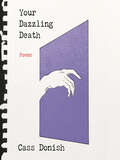
Your dazzling death: Poems (Cass Donish and Kelly Caldwell Books #1)
Par Cass Donish. 2024
Written in the devastating aftermath of a partner’s suicide, this unprecedented collection is a restorative memorial act, an exploration of…
queer time, and a powerful expression of nonbinary and trans love in the wake of traumatic loss. “suddenly a brilliant red-tailed star / flew across the sky, a sun reversing time, / I crossed one world to another / I stood with her in the other world” In Your Dazzling Death , Cass Donish courageously summons the poems to witness their own state of “obliteration,” widowed by suicide and isolated as a global pandemic is unfolding. Elegizing their partner, the poet Kelly Caldwell, they insist that the intimate, ongoing conversation with a beloved mysteriously continues after loss. With searing vulnerability and profound perceptiveness, Donish finds a fierce new aesthetic for the disorientation of grief. “Let me paint this / entire country / the colors of your face,” they write, unearthing the wild and shifting scale of mourning. Donish affirms the beauty of their lover’s trans becoming, recalling when they “sounded out / your new potential names / until we found those syllables / that tasted, you said, like honey.” In the sequence “Kelly in Violet,” the centerpiece of this collection, the shattering experience emerges in conversation with the work of Uruguayan poet Marosa di Giorgio, whose words appear in ghostly traces. Your Dazzling Death ritualizes the work of grief and subverts linear time, asserting that the future will forever be informed by a monumental love that is still alive, not only in the past, but in an imagined space of timelessness where love and grief are inevitably intertwined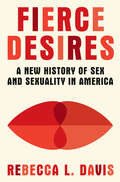
Fierce Desires: A New History of Sex and Sexuality in America
Par Rebecca L. Davis. 2024
From an esteemed scholar, a richly textured, authoritative history of sex and sexuality in America—the first major account in three…
decades. Our era is one of sexual upheaval. Roe v. Wade was overturned in the summer of 2022, school systems across the country are banning books with LGBTQ+ themes, and the notion of a “tradwife” is gaining adherents on the right while polyamory wins converts on the left. It may seem as though debates over sex are more intense than ever, but as acclaimed historian Rebecca L. Davis demonstrates in Fierce Desires, we should not be too surprised, because Americans have been arguing over which kinds of sex are “acceptable”—and which are not—since before the founding itself. From the public floggings of fornicators in early New England to passionate same-sex love affairs in the 1800s and the crackdown on abortion providers in the 1870s, and from the movements for sexual liberation to the recent restrictions on access to gender affirming care, Davis presents a sweeping, engrossing, illuminating four-hundred-year account of this nation’s sexual past. Drawing on a wealth of sources, including legal records, erotica, and eighteenth-century romance novels, she recasts important episodes—Anthony Comstock’s crusade against smut among them—and, at the same time, unearths stories of little-remembered pioneers and iconoclasts, such as an indentured servant in colonial Virginia named Thomas/Thomasine Hall, Gay Liberation Front cofounder Kiyoshi Kuromiya, and postwar female pleasure activist Betty Dodson. At the heart of the book is Davis’s argument that the concept of sexual identity is relatively novel, first appearing in the nineteenth century. Over the centuries, Americans have shifted from understanding sexual behaviors as reflections of personal preferences or values, such as those rooted in faith or culture, to defining sexuality as an essential part of what makes a person who they are. And at every step, legislators, police, activists, and bureaucrats attempted to regulate new sexual behaviors, transforming government in the process. The most comprehensive account of America’s sexual past since John D’Emilio and Estelle Freedman’s 1988 classic, Intimate Matters, Davis’s magisterial work seeks to help us understand the turmoil of the present. It demonstrates how fiercely we have always valued our desires, and how far we are willing to go to defend them.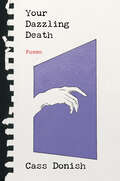
Your Dazzling Death: Poems (Cass Donish and Kelly Caldwell Books #1)
Par Cass Donish. 2024
Written in the devastating aftermath of a partner&’s suicide, this unprecedented collection is a restorative memorial act, an exploration of…
queer time, and a powerful expression of nonbinary and trans love in the wake of traumatic loss.&“suddenly a brilliant red-tailed star / flew across the sky, a sun reversing time, / I crossed one world to another / I stood with her in the other world&”In Your Dazzling Death, Cass Donish courageously summons the poems to witness their own state of &“obliteration,&” widowed by suicide and isolated as a global pandemic is unfolding. Elegizing their partner, the poet Kelly Caldwell, they insist that the intimate, ongoing conversation with a beloved mysteriously continues after loss.With searing vulnerability and profound perceptiveness, Donish finds a fierce new aesthetic for the disorientation of grief. &“Let me paint this / entire country / the colors of your face,&” they write, unearthing the wild and shifting scale of mourning. Donish affirms the beauty of their lover&’s trans becoming, recalling when they &“sounded out / your new potential names / until we found those syllables / that tasted, you said, like honey.&” In the sequence &“Kelly in Violet,&” the centerpiece of this collection, the shattering experience emerges in conversation with the work of Uruguayan poet Marosa di Giorgio, whose words appear in ghostly traces.Your Dazzling Death ritualizes the work of grief and subverts linear time, asserting that the future will forever be informed by a monumental love that is still alive, not only in the past, but in an imagined space of timelessness where love and grief are inevitably intertwined.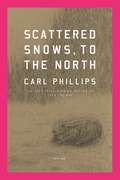
Scattered Snows, to the North: Poems
Par Carl Phillips. 2024
An arresting study of memory, perception, and the human condition, from the Pulitzer Prize winner Carl Phillips. Carl Phillips’s Scattered…
Snows, to the North is a collection about distortion and revelation, about knowing and the unreliability of a knowing that’s based on human memory. If the poet’s last few books have concerned themselves with power, this one focuses on vulnerability: the usefulness of embracing it and of releasing ourselves from the need to understand our past. If we remember a thing, did it happen? If we believe it didn’t, does that make our belief true? In Scattered Snows, to the North, Phillips looks though the window of the past in order to understand the essential sameness of the human condition—“Tears / were tears,” mistakes were made and regretted or not regretted, and it mattered until it didn’t, the way people live until they don’t. And there was also joy. And beauty. “Yet the world’s still / so beautiful . . . Sometimes // it is . . .” And it was enough. And it still can be.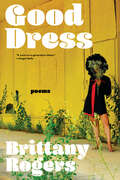
Good Dress
Par Brittany Rogers. 2024
“A once-in-a-generation debut.”—Angel Nafis “This self-assured, dazzling debut has a story to tell.”—Aricka Foreman Following the tradition of Nikky Finney,…
Krista Franklin, and Morgan Parker, Brittany Rogers’s Good Dress documents the extravagant beauty and audacity of Black Detroit, Black womanhood, community, class, luxury, materialism, and matrilineage. A nontraditional coming of age, this collection witnesses a speaker coming into her own autonomy and selfhood as a young adult, reflecting on formative experiences. With care and incandescent energy, the poems engage with memory, time, interiority, and community. They also nudge tenderly toward curiosity: What does it mean to belong to a person, to a city? Can intimacy and romance be found outside the heteronormative confines of partnership? And in what ways can the pursuit of pleasure be an anchor that returns us to ourselves?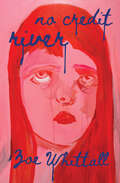
No Credit River
Par Zoe Whittall. 2024
“It is a confusing thing to be born between generations where the one above thinks nothing is traumaand the one…
below thinks everything is trauma.”From acclaimed novelist and television writer Zoe Whittall comes a memoir in prose poetry that reconfirms her celebrated honesty, emotional acuity, and wit. Riving and probing a period of six years marked by abandoned love, the pain of a lost pregnancy, and pandemic isolation, No Credit River is a reckoning with the creative instinct itself.Open and exacting, this is a unique examination of anxiety in complex times, and a contribution to contemporary autofiction as formally inventive as it is full of heart.